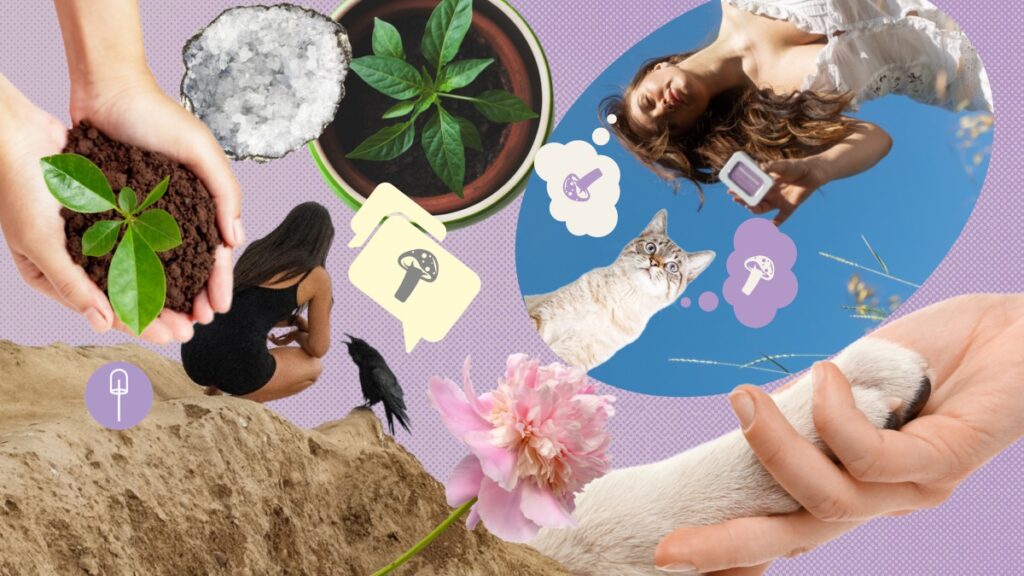Have you ever experienced a mushroom trip that completely immersed you in nature for hours? Or had an other-worldly animal encounter that made you re-evaluate your connection with the animal kingdom? Turns out, there may be more to these experiences than just the mushrooms themselves.
The biophilia hypothesis conceptualizes the human’s intrinsic longing to connect with animals and other living organisms. According to the hypothesis proposed by biologist Edward O. Wilson, our history of human evolution has imposed a deep-seated connection between us, and the natural world. This yearning for connection extends to both animals and plants.
But what does Wilson’s hypothesis have to do with mushrooms? Well, preliminary research has revealed that the presence of biophilia, the innate affinity for nature, is thought to be intensified during mushroom-induced states, and frankly, we can’t be so surprised.
In this hypothesis, engagement with the natural world has the ability to improve mental health, aid in stress regulation, and boost cognitive function. The hypothesis also supports the idea that engaging with nature is a fundamental physiological need for human beings, emphasizing that a deficiency in this connection can reap negative consequences over both mental and physical well-being.
Biophilia as a concept has made an influential impact on a variety of fields, including architecture, environmental conservation, and psychology. In the process of becoming familiar with biophilia and its meaning, (love of life), we can begin noticing a divine connection between biophilia and psychedelics that reveals a truly fascinating relationship.
- Biophilia and Psychedelics
Biophilia beautifully exhibits our connection to other forms of life outside of ourselves, and is not limited to just animals and plant life. Things like water, wind, sound, and scent are all equal elements of biophilia, for they all exist in our very nature.
Biophilia can be experienced in simple acts, such as taking a walk outdoors and being naturally attracted to the lush shades of green, feeling the cool breeze of wind, or encountering the sweet presence of a deer nearby.
This accumulation of gratitude towards nature can benefit an individual in a variety of ways, in both physical and mental contexts. Excitingly, it is now believed that psychedelic substances can actually enhance one’s sense of biophilia, adding yet another fascinating variable to the expansive list of health effects associated with psychedelics.
Research has suggested that the use of psychedelics may also be closely associated with improved environmental behaviors and attitudes. One pilot study found that psilocybin-assisted therapy sustained an increase in nature-relatedness, which refers to the extent of which individuals feel connected to the natural world.
Those who experience high degrees of nature-relatedness will often possess stronger emotional and cognitive bonds with nature, which we now know to be associated with greater, more positive physiological outcomes.
Psychedelic-induced biophilia is thought to effectively raise awareness and gratitude toward nature as well as animals while under the influence of psychedelics, dissolving the sedentary boundaries between oneself and the external world.
Psychedelics are known to evoke feelings of connectedness and unity with nature, which aligns with the desire to seek outdoor environments when on psychedelics. The impact of psychedelic biophilia on an individual’s connection with nature can be long-lasting, as it offers them a fresh perspective on their external surroundings to be extended both during and outside of the psychedelic trip state.
Studies have also suggested that the use of psychedelics can be associated with lower speciesist attitudes and a stronger sense of unity with wildlife. It is speculated that the dissolution of ego amplifies the humans’ desire to help animals, emphasizing the impact of psychedelic substances within animal-human relations.
The amplified levels of interconnectedness, empathy, and presence, alongside a dissolved ego elicited by psychedelic use, are speculated to ignite pro-environmental behavior as well as animal solidarity. This adds a beautiful and inspiring element to the mechanisms of psychedelics, which will hopefully be explored further as research on the topic advances.
- Animal to Human Relations on Psychedelics
The inspiration for this article stemmed from a moment of reminiscing about past psychedelic experiences. During said experiences, it often felt as though the connection and communion between human self and wildlife took on a deeper and more personal significance.
In the midst of an intense mushroom trip, I noticed that normally skittish birds would approach me much closer than in regular life, as would deer, owls, cats, etc. This remarkable Disney Princess phenomenon was consistent during my psychedelic experiences, yet would never persist once the effects of the mushrooms wore off.
Now, this isn’t to say that we should go test our luck with a black bear by any means, nor should we ever interrupt an animal in its own habitat. Rather, it is these special empathetic occasions generated by psychedelics that truly put the power of biophilia and psychedelic-induced interconnectedness into full perspective.
Reflecting on these encounters, a question emerged: Could the animals sense that I was existing at a heightened state of consciousness, facilitated by the psychedelic substance (aka tripping on mushrooms), or was it the amplification of biophilia—an intense love for and connection to nature—that I was experiencing all along? Let’s speculate.
I think it’s fair to say that there is no way to determine whether or not a pigeon or a house cat could ever sense that a person is on psychedelics, though after digging through multiple mushroom and other psychedelic forums, it seems I am not the only one with this unconventional inquiry.
Realistically speaking, it is highly unlikely that a pigeon or a house cat could detect when someone is on psychedelics. However, it’s important to note that there may be changes in our outlook occurring for other reasons, such as enhanced biophilia, heightened empathy, and shifts in general perception. These changes may have us more inclined to welcome interactions with animals, as psychedelics often prompt a sense of unity with nature that we may otherwise overlook or disregard in regular life.
Studies suggest that individuals under the influence of psychedelics are more likely to experience a heightened sense of connection to the natural world, including increased compassion toward other creatures. These findings provide insights into why we often feel a strong affinity for animals, trees, and other living things during our entheogenic experiences.
- Therapeutic Benefits
This incredible experience of getting to know and feel biophilia on such a marvelous level is truly something to be grateful for. Our desire to become one with nature is an innate human trait, although we often lose sight of this as we become bombarded with the business and mundanities of everyday life.
The more we familiarize ourselves with the feeling of biophilia, the more likely we are to sustain it on a regular basis.
- Mental well-being
When we experience biophilia, we are fostering a deeper sense of unity, admiration, and reverence for the world we live in. This deepened connection can nurture our lives with newfound meaning and purpose, as we develop gratitude for things we often overlook. Utilizing the power of plant medicine to rekindle our lost bond with nature can have a significant impact on mental health and well-being, making it an excellent option for individuals grappling with feelings of disconnection–a common symptom of depression, anxiety, and other mental health conditions. Becoming more aware of our connection to animals and nature can also expedite emotional healing, helping to alleviate feelings of isolation or loneliness.
- Stress Management
The urge to immerse oneself in nature both in and out of psychedelic influence is an effective way to mitigate stress levels and promote deeper relaxation. Natural surroundings are full of soothing elements, from the sound of the wind above to the texture of the grass below. Psychedelics are known to amplify these natural soothers by intensifying our sensory reception, turning everyday nature into a profound, and therapeutic experience.
- Creativity
Psychedelics also have a knack for evoking creative urges, which is why self-expression may feel a bit easier under their influence. In the context of biophilia, psychedelics may spark new ideas of how to engage with nature, whether it be through artistic expression or other immersive activities.
- New perspectives
While it’s commonly believed that humans have an innate need for engagement with nature, not everyone feels so drawn to it. Some individuals may have fears of wildlife, allergens, or other outdoor occurrences that hinder their connection with nature. However, experiencing a profound sense of oneness with nature can be an incredibly transformative and enriching experience. In certain cases, psychedelic substances may be effective in facilitating this connection.
By altering consciousness and perception, psychedelics can help individuals overcome barriers and become familiar with their natural ecological self.
Sources:
https://www.mdpi.com/2813-1851/2/2/12
https://www.ncbi.nlm.nih.gov/pmc/articles/PMC9266040/



